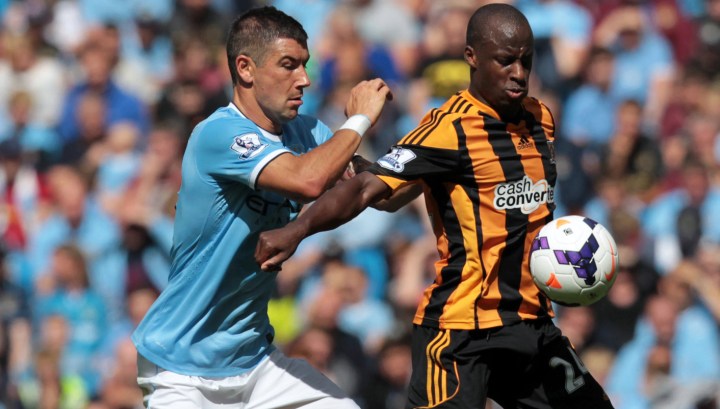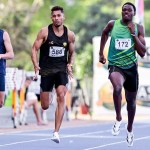Sport
Daily Maverick interview: Hull City and Nigeria’s Sone Aluko

Hull City striker Sone Aluko spoke to ANTOINETTE MULLER about the decision to play for Nigeria, racism in football, African identity, reading books and that face-off with Arsenal’s Lukas Fabianski in this year’s FA Cup final.
In modern football, nationality has pretty much become a moot point. More than half of the Algerian squad who just participated in the World Cup were born in France. Ghana have Kevin-Prince Boateng, born in Germany.
Sone Aluko was born in the United Kingdom to Nigerian parents, did much of his training here but eventually opted to represent Nigeria. Although he missed out on a World Cup berth this year, he’s played for the side before. Having represented England at youth level, it all seemed a natural progression. He was never really given the choice, until the 2009 Under-19 World Cup in Egypt when both countries called him up.
“I went to an English school and started playing for them at 16. It was sort of natural progression,” Aluko explains to the Daily Maverick.
“I spoke to my parents about it a lot. I think growing up, when it came to World Cups, I’d always supported Nigeria. I looked up to guys like Kanu, Oche Okechukwu and Sunday Oliseh. My international heroes were always Nigerian, whereas at club level it was always Man United players or Thierry Henry. It matched my dream more to play to for Nigeria,” he says.
“But I still support England when they are at major tournaments, I want them to do well.”
International football, Premier League, FA Cup Finals, it’s all a dream life, but it’s not always been so easy for Aluko. Growing up on an estate in Birmingham, his rise through the ranks has come with many challenges.
“I’m not sure you’re supposed to be a Premier League footballer from where I grew up,” he muses.
Aluko’s career started off at Birmingham City before he moved to Scotland. From May 2011 to November 2011 he wasn’t playing due to a pay dispute between Rangers and Aberdeen. For six months he was without a club and not getting paid. Aberdeen were demanding £150,000 in compensation from Sone’s prospective club Rangers and neither club wanted to back down.
He’d spend his days training alone in King’s Norton Park in Birmingham and while he was going for trials, the compensation clause was a massive hindrance. When the deal was eventually brokered, he finished the season with Rangers as top scorer and moved to Hull City. He was part of their promotion campaign in his first season and although he missed half of it through injury, getting to the Premier League and staying up was fairytale stuff.
“Getting promoted was a dream come true. It’s always been a league I wanted to play in. The start of that promotion season was interesting. We were always third or second; as a team we were quietly confident, but people still didn’t think we’d get promoted.
“For the club, for the city, for the players, it was huge to stay up. It was one of the best finishes we’ve had in our history,” he says.
Part of that finish included an FA Cup final at Wembley against Arsenal. The match had to go to extra time before it was settled. In the dying minutes, a moment of madness from Arsenal’s Lukas Fabianski very nearly saw Aluko score to take the match to penalties. Losing was a disappointment, but it was a clever run from a player who has showed much potential over the years.
“In Nigeria everyone is an Arsenal fan so everyone was asking me how I could do that to them. My dad supported Arsenal when I was growing up, too,” he laughs.
Prior to making the decision to represent Nigeria instead of England, Aluko had not visited the country much, but since then, he returns at least twice a year. On his most recent trip, he was so enamoured by a young kid who managed to dig out his e-mail address from somewhere that he changed his flight to spend time at the school and chat to the students. His younger siblings were schooled in Nigeria for a few years and Aluko suspects it’s through that connection that the youngster got hold of him.
“I don’t know how he did, but I was so impressed with the effort he went through to get in touch. When I was that age, I would never have done something like that. I thought he was brave and very polite,” he says.
Inspiring a new generation is something the 25-year-old thinks about a lot more often these days. Although becoming a pro footballer isn’t for everyone, it is possible, but above everything he tells kids to stay in school.
“I’ve been thinking a lot more recently about inspiring kids. The number of people who become professional footballers are really slim. So I try to inspire kids to stay in school and if they meet you, [let them] see that you’re just a normal person.
“I love talking to kids because they just love hearing what you have to say. They just want information and [to] ask you random questions. When I was young, I didn’t have access to footballers, so I try to give access to young kids because it gives them a dream,” says Aluko.
African identity is an important debate and it’s something Aluko believes in strongly. It’s something that has been especially prevalent during this World Cup and something he’s experienced before.
“When I went to Egypt for the Under-20 World Cup, the Egyptians supported us like we were Egyptians. They really got behind us and it was a great feeling,” he recalls.
“Africans are little bit different to the rest of the world. I’m not sure what it is that connects us, but it’s good to see. Obviously it’s not a country, but to see that togetherness is good. And when there is a bright spark or an athlete that does well, we want to show the world that we’re not only the place you send your donations to,” he says.
But that does not mean that he is without its problems. At this year’s World Cup, Cameroon, Ghana and Nigeria were all locked in bonus disputes during the tournament,and while Aluko doesn’t agree with the strikes, he can understand why they happen.
“I think the troubles at World Cups for African teams happen for many different reasons. I think the past has coloured people’s perceptions of African football. I think they remembered how very bad it used to be, [and] they just want things to be right now. It has previously cost players to play for their country at tournaments, so it’s not just national service anymore. It needs to be an honour,” he says.
Successful African teams hold more clout in their country than almost anywhere else in the world and it’s a matter of earning respect and recognising their efforts instead of using players as pawns.
“Not every player who plays for an African country is playing in a top European club either. Financially they might be struggling in their league so they don’t want it to cost them money. Successful African teams can win elections, so the players are also aware of how much of an impact they have and how much money the FAs are making off them,” he adds
Identity also forms part of race, and racism in football is something that many players experience. Although he has not had trouble in the Premier League, his time at Rangers brought some problems, but Aluko does not know whether racism is simply used as a tool of annoyance.
“At Rangers I did experience some racism. Fortunately I’ve not had to deal with it since I’ve been back in the Premier League, but there are strange cases of it happening. Sometimes I don’t even know if the person is racist or if they are just trying to use racism to get under my skin,” he says.
With the prevalence of successful black footballers, Aluko also thinks it’s much harder to be racist these days, and believes that a lot is said to simply try to get a reaction. He adds, though, that it is something that will always be a problem.
“I think it’s harder for young person to be racist these days, though. For example, if you support Man City, where Yaya Toure is a start and you have a poster of a black person on your wall, it’s going to be hard to be racist.
“A lot of it these days is said because people are just trying to provoke you. There will racism in football because it is part of society. Anything that is in society will translate into football,” he says.
The punishment for racist fans has been in the news a lot and the Hull player does think that more can be done to make it clear that it’s not acceptable.
“I think the sanctions are a bit lenient. If you look at the NBA and how they responded to Donald Sterling and how swiftly they responded…I don’t think racism can be stopped, I think it can only be punished when it happens. I think football should be a way to combat these issues. I think Fifa can do more with the punishments, but to stop it completely, I don’t know that’s possible,” Aluko says.
Away from football, a strong family bond and parents who allowed him to pursue his dreams significantly aided his career. His sister, Eniola, is also a professional footballer, who plays for England and Chelsea Ladies. The two regularly call each other and talk about each other’s performances. Although he’s not thought much about life after football, Aluko has started doing his degree through long distance learning and when he’s off the pitch, he likes to read. He’s set himself a goal to read a book a month and is up to six this year.
“This year I’ve tried to read longer books. I’m on the last chapter of Half a Yellow Sun; it’s taken a while to get through because I’ve been on holiday,” he says.
A player with much talent and with clear goals in mind, Aluko has a bright future ahead. With Hull’s pre-season about to begin, he’s already thinking about where to push himself to this season. He trusts his ability, and with an Africa Cup of Nations coming up in 2015, playing international football is definitely on the cards.
“Football is always there for goals. I set myself about ten or 15 every season to try to push myself forward. I don’t want to rest on my laurels. Internationals is a big dream. Missing out on the World Cup was a disappointment, but there is a Africa Cup of Nations coming up next year too,” he says.
As young players with much talent and their heads screwed on straight, both Sone Aluko and his sister have clearly got this life and footballing thing figured out – and are living proof that with hard work, talent and determination, dreams do come true. DM
Photo: Manchester City’s Aleksandar Kolarov (L) in action against Hull City’s Sone Aluko during the English Premier League soccer match between Manchester City and Hull City at the Etihad Airways stadium in Manchester, Britain, 31 August 2013. Man City won the match 2-0. EPA/LINDSEY PARNABY




















 Become an Insider
Become an Insider